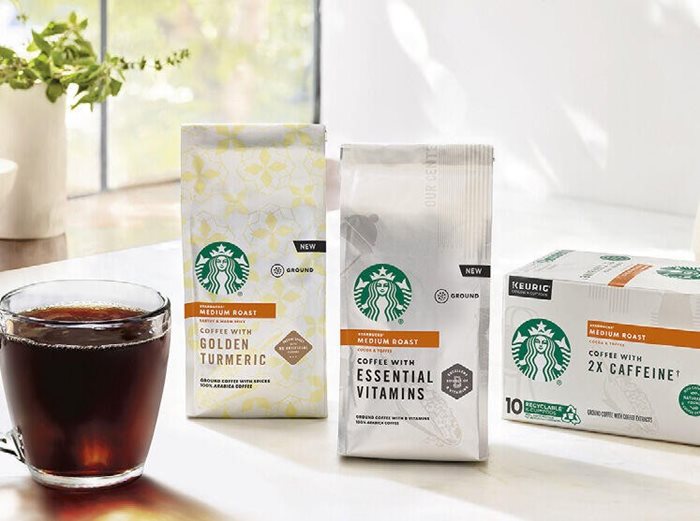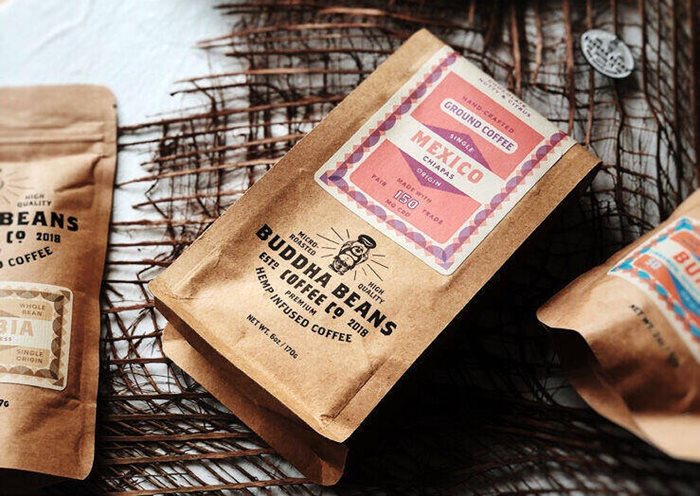From turmeric to mushrooms, coconut oil, CBD and collagen – can adding a colourful array of supplements to coffee help cafés stand out from the crowd in an increasingly competitive market? Isabelle Mani investigates the opportunities and pitfalls for operators navigating the world of fortified coffee beverages
.png.aspx?lang=en-GB&width=700&height=393)
Approximately 45% of global food and beverage launches between 2020 and 2021 had a health or nutraceutical benefit | Photo credit: Pawel Czerwinski
Fortifying coffee beverages to support health and boost performance is not a new phenomenon.
From brain-boosting mushrooms and yerba mate to the purported cosmetic benefits of adding collagen, it seems the coffee industry is never far away from the next social-media fuelled trend. But do these products stack up and can operators benefit from the buzz?
In the US, World Coffee Portal data indicates 49% of consumers surveyed in 2020 were more likely to purchase a coffee shop beverage with associated health claims.
Moreover, approximately 45% of global food and beverage launches between 2020 and 2021 had a health or nutraceutical benefit claim according to research by food and beverage manufacturer, Kerry.
“Consumers now prefer great-tasting drinks with layered functionality benefits rather than adding supplements,” says Simon Hague, Director of Tea, Coffee, Cocoa & Functional Beverage Systems for Kerry APMEA (Asia Pacific, Middle East and Africa).
Hague believes the impact of Covid-19 only accelerated this existing trend, with health and general wellness influencing 65% of consumers when purchasing food and drinks.
According to Kerry’s research, energy and alertness are the highest growing functional beverage benefits, with 37% of the company’s new product development falling under the functional beverage category.
Beverages with a nutri-cosmetic appeal are also crossing over to the functional coffee market, with beverage additions such as selenium, a mineral with immune system and cognitive boosting properties, and collagen, which has promoted skin health benefits.
Adaptogen ingredients, such as ginseng, ashwagandha, turmeric and botanicals are already popular with consumers worldwide, particularly in Asia Pacific, where consumption is long ingrained, says Hague.
In western markets, some major brands are investing in nutrition-optimising coffee product development. Founded in 2011, Bulletproof was an early proponent of functional coffee, with its range of butter and oil-infused coffee promoting health benefits including weight loss and increased energy levels.
Highlighting the mainstream success of the range, in 2022 Nestlé launched its own take on the product with its Boosted Brew KETO Coffee Enhancer, marketed as an addition to standard coffee.
Starbucks, too, has launched an at-home range of functional coffees infused with golden turmeric, essential vitamins, and even with double caffeine.

Starbucks’ turmeric, vitamins and double caffeine retail packaged coffee range | Photo credit: Starbucks
Benefiting from the buzz
Encouraging consumer trust by mixing on-trend and science-backed botanicals with coffee and tea presents an opportunity for operators and coffee shops, says Aly Ang, the head of PR at Singapore-based Flash Coffee, which operates more than 200 stores across seven Asian markets.
In May 2022, Flash launched a range of collagen-infused coffee beverages, a move that Ang says increased brand resonance by attracting nutri-cosmetic beverage and supplement consumers.
The products’ success is being backed by “ongoing positive feedback on social media,” Ang adds.
Leading coffee chains in the US, such as Starbucks and Dunkin, have introduced matcha and green tea additions, which have antioxidant properties, to their latte offerings, alongside ginger and turmeric shots.
However, the introduction of coffee supplements by major branded chains has so far been slow, with regulatory hurdles and a lack of consumer awareness remaining key barriers to implementation.
With CBD products gaining traction among major health retailers around the world, it’s likely the product’s appeal will continue to grow
Coffee additions that demand tighter government approval, such as CDB-infused coffee, or Kava, a botanical that claims to enhance cognition, have, however, gained traction among independent coffee shops in the US and UK.
These smaller-scale pioneers are often seen as testbeds of innovation for the wider industry, as demonstrated by the segment’s early adoption of cold brew and nitro coffee.
CBD One is a UK-based start-up that sells CBD products to be infused with coffee in-store. The company has trialled the incorporation of its products in several independent coffee shops in the UK.
According to CBD One Director Alex Tofalos, coffee shop owners saw an influx of new customers eager to try CBD-infused drinks, which promote benefits including reducing anxiety and improving cognition.
“CBD naturally generates a great deal of intrigue, and any business offering CBD shots or CBD-infused food and drinks will get a lot of attention and attract new customers through the door,” says Tofalos.
Functional additions to beverages such as CBD and collagen have a higher ticket price in the market.
Still, Tofalos doesn’t perceive this as a barrier to coffee shop penetration. “CBD is expensive due to high production costs in a new industry bound by tight regulations.
Therefore, someone is likelier to try CBD by paying 50p or £1 extra instead of spending £30 ($36) or more for a bottle of CBD oil,” he says.
Looking to the future, CBD One hopes to engage mainstream coffee chains in the UK, but Tofalos recognises that barriers around product perception and regulation remain a challenge for mainstream operators.
Nevertheless, with CBD products gaining traction among major health retailers around the world, it’s likely the product’s appeal will continue to grow.

Buddha Beans ‘hemp-infused’ coffee | Photo credit: Buddha Beans
Regulators at the gate
Knowing your market is essential when retailing supplement-infused coffee, as local regulations differ greatly. In the UK, where CBD One operates, other brands including London’s CBD Coffee and Cheerful Buddha have also found success in a nascent CBD-infused coffee market.
However, in the US the picture has been more complex. Caffeine Underground is an independent coffee shop and online retailer in Brooklyn New York offering kava, matchá, bulletproof coffee and yerba mate as add-ons to coffee beverages. The business’ owner Ian Ford says his customers choose functional drinks for health benefits to alleviate anxiety, pain, depression, and increase cognitive capacity.
Caffeine Underground was one of the first coffee shops in the city to offer CBD-infused coffee in 2018, which levelled off at about 30% of their sales at the time. “There were lines down the block,” recalls Ford.
However, the café stopped selling the beverage almost a year later.
“The NYC Dept. of Health and Mental Hygiene (NYC DOHMH) showed up and told us that NYC restaurants can no longer serve ʻadulterated foodsʼ, meaning infused,” says Ford.
Nonetheless, Bodegas, a major New York convenience store in the area, is still able to sell CBD beverages because as a retailer it falls under the jurisdiction of the US Department of Agriculture and not the NYC DOHMH.
Despite this, Ford says CBD coffee is still a solid market for coffee shops outside of New York, and that adding other health boosting ingredients at his coffee shop remains a “huge selling point.”
Operators should be wary of whether consumers will be willing to pay an added premium for their daily cup of Joe
The next big thing?
Kerry’s Simon says there is significant pressure on manufacturers and food service companies to accelerate product development across broader consumer bases and distribution channels. He believes that timing is critical to being competitive in this segment.
“We know consumers are more likely to try innovative offerings in beverages before food, making the beverage category a highly innovative channel with opportunities,” he says.
Flash Coffee’s Ang echoes that embracing the functional beverage market is necessary to maintain brand value and relevance and that evolving alongside changing consumer preferences can expand a brand’s reach.
“There is an opportunity for other players in the coffee industry to tap into this trend, and brands that fail to innovate will miss out,” she says.
Although a nascent market, functional coffees may hold the potential to be more than a passing trend. With consumer appetite for health-promoting functional coffee beverages growing, particularly in the at-home market, operators making a foray into the category stand to gain from higher visibility, competitor differentiation and attractive sales margins. However, they should be mindful of the potential regulatory hurdles ahead – and whether consumers will be willing to pay an added premium for their daily cup of Joe.
This article was first published in Issue 11 of 5THWAVE magazine.
Subscribe to 5THWAVE to receive each edition in print and digitally or sign up to our newsletter and be the first to read the latest articles and updates on World Coffee Portal research.
.png.aspx?lang=en-GB)